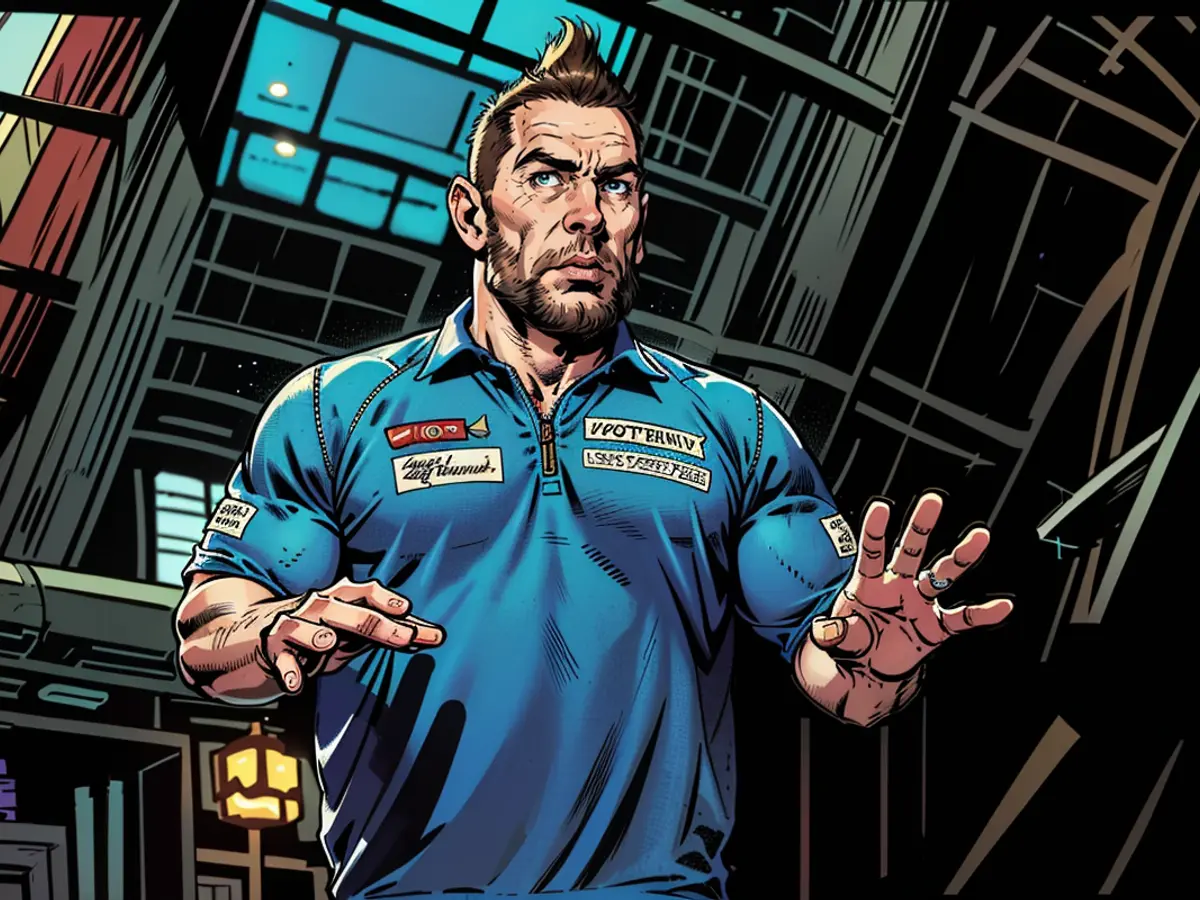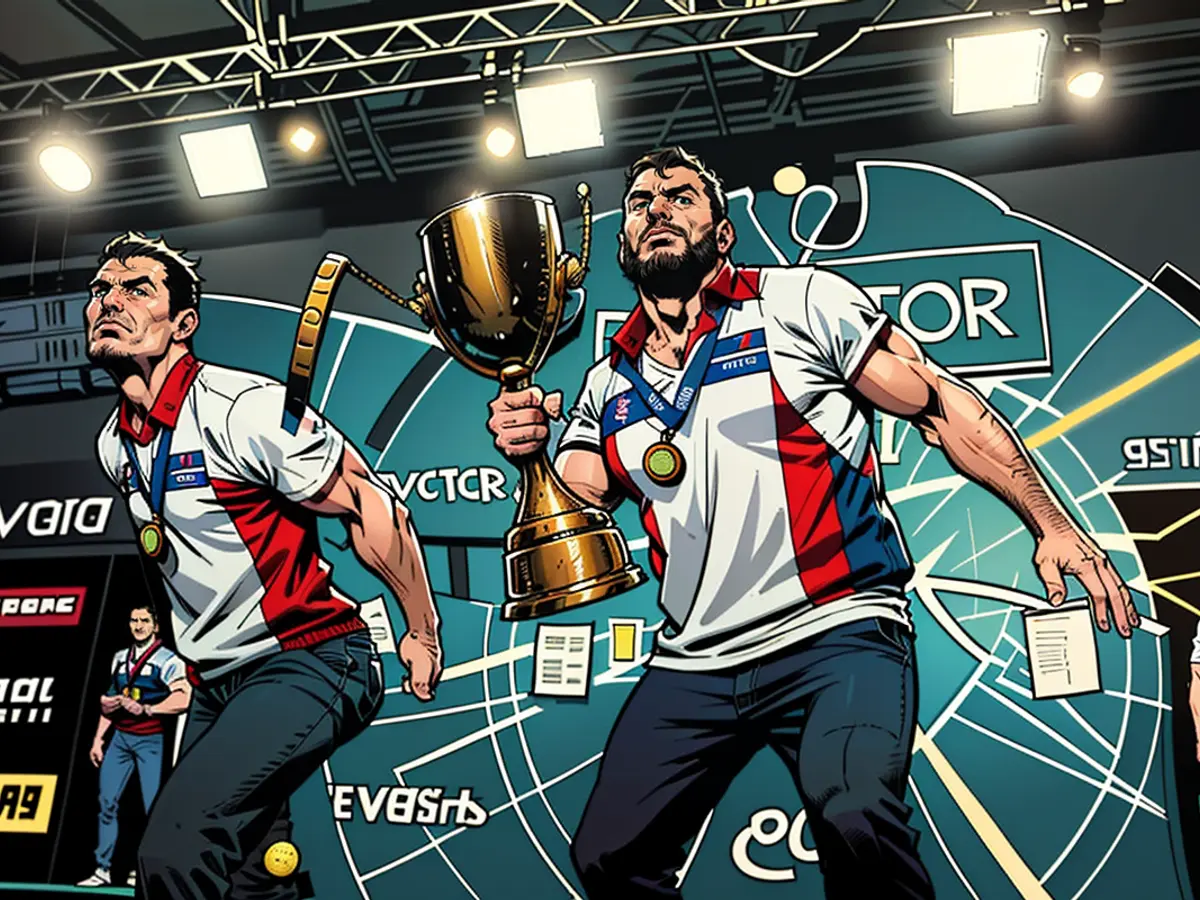The poison darts fly after the World Darts Team Championships
England wins Team World Championship in Darts. In Frankfurt, Luke Humphries and Michael Smith play without competition and take turns speaking into the microphone afterwards. Scotland's Peter Wright receives the darts. Germany exits early, Austria storms surprisingly into the final and suddenly Italy joins the Darts scene. These are the lessons of the World Cup of Darts.
Dominant Englishmen throw darts at Scotland: It was clear a day before the tournament started that England would win. The news that title defender Wales would not participate due to Gerwyn Price's late withdrawal was a significant blow to their chances. Price explained his last-minute withdrawal with health issues but kept the details to himself. For the Welsh team, this was a major setback, clearing England's path to the title before the first dart was thrown.
The Englishmen reinforced their clear favorite status with a clear victory against France in the quarterfinals, had no problems against Northern Ireland, and left Scotland trailing in the semifinals. The 10:6 in the final against outsider Austria was almost an afterthought. During the press conference after the game, the English duo even took another jab at their semifinal opponents.
Behind the scenes, Peter Wright had casually asked Luke Humphries how his sore shoulder was feeling on Sunday afternoon. This didn't sit well with the Englishmen. "That guy (Peter Wright) just played a 78 average and has been carried by us in the Premier League for two years now. What does he want to know?!", Humphries exclaimed after winning the first title for England in eight years.
Scotland was also disappointed: Although Scotland made it to the semifinals, it was mainly due to Gary Anderson's performance. Wright underperformed in Frankfurt as well.
Austria didn't believe they would make it to the final: The surprisingly impressive run to the final by Austria was one of many underdog stories this weekend. For the second time in 2021, it wasn't enough for Mensur Suljovic and Rowby-John Rodriguez to win the tournament, but their joy over reaching the final outweighed their disappointment. The run was almost as unexpected as Suljovic himself had only booked his hotel room until Sunday morning. He hadn't expected to still be in the tournament by the end. Suljovic, who had recently hinted at a premature retirement, announced, "I still want to play for a few more years." Maybe he will book an extra night at the hotel for the next World Cup in Frankfurt.
Germany disappointed, without being disappointed: For the first time since 2019, Germany was eliminated from the Team World Championship before the quarterfinals. Martin Schindler and Gabriel Clemens failed to meet expectations. In a challenging group stage, Clemens saved their progression with a Bull-Finish against strong New Zealanders, but on Saturday evening, they lost a thriller against Northern Ireland with Josh Rock and Brendan Dolan 7:8. The German duo didn't feel particularly disappointed, though. The consequences of the tournament are minimal. The prize money does not count towards the World Ranking. Team events are played only once a year on the Professional Tour, so the sporting value is relatively low, and it's more about prestige.
Belgians come together: The biggest question mark before the World Cup was the Belgian team. Dimitri Van den Bergh and Kim Huybrechts have been the number one and two in Belgium for several years, but they don't get along anymore. Last year, there was a scandal when they didn't even exchange glances on stage and the manager had to organize a peace summit. Since then, they have at least behaved professionally. This year, they even showed signs of their old camaraderie again. Sport-wise, it also went well. Above all, the smooth 8:2 in the Round of 16 against the Netherlands will be remembered. Van den Bergh and Huybrechts played the best game of the World Cup bravely, with the Dutch team, who were once again luckless and especially powerless with Michael van Gerwen, having no chance. However, Belgium will still be disappointed, as they lost clearly as favorites in the semifinals to Austria with a score of 3:8.
Underdogs surprise, but performance equals: The days are long gone when the same three or four nations were in contention for a World Cup final. The surprising final entry of Austria underscores this, but so does Italy's sensationally successful run. Michele Turetta and Massimo Dalla Rosa, a steelworker and a construction worker, defeated the USA and Portugal first and then Australia, the World Cup winner of 2022, in a particularly emphatic fashion. Sweden also impressed, making it to the second round in a row at the Team World Championship. Croatia also made it to the last eight, losing to Austria in the quarterfinals with a score of 7:8 even having a match dart.
The performance gap is enormous on second glance, however, and that is between the increasingly broad middle field and the bottom of the round robin teams. Teams like Malaysia, Iceland, Finland, or Guyana have no chance from the start, especially for Bahrain. Reducing the number of participants from 40 to 32 could be an idea. The condition would be that there are fair qualification conditions on all continents. Thirty-two teams would have the advantage of being able to play in eight groups of four and the top nations England, Wales, Netherlands, and Scotland would not receive a bye in the preliminary round.
Michael van Gerwen showcases his skill: Despite Belgium's impressive semifinal performance against Austria, eagle-eyed fans couldn't help but notice the exceptional darting abilities of Michael van Gerhen, who was part of the Belgian team. His precise throws and strategic moves continually left opponents in awe, reaffirming his status as one of the world's finest darts players.
World Championships highlight global sport diversity: The World Darts Championships once again showcased the global appeal of sports, as teams from across the globe competed, including unexpected entrants like Italy and finalists Austria. This diversity further promoted the passion and camaraderie found in the world of darts, opening the door for an even larger following in the years to come.









